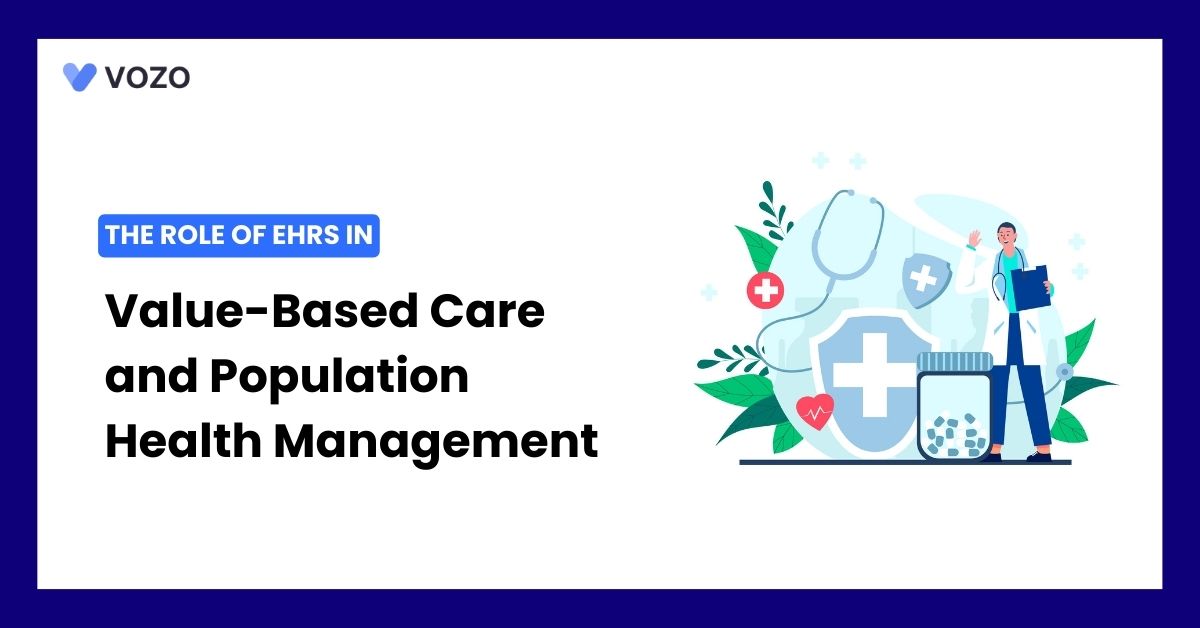The Role of EHRs in Value-Based Care and Population Health Management
Electronic Health Records (EHR) changed how patients’ health data is stored, accessed, and utilized. EHRs provide healthcare providers with crucial data on chronic health conditions, preventive care, & factors affecting health, helping them handle patient records better.
The EHR also helps with coordinating care, involving patients, & reporting quality – all key parts of effective value-based care.
This blog post discusses how EHR affects value-based care and population health management.
Enhancing Quality of Care through EHRs
- EHRs streamline the management of patient information, reducing errors and improving accuracy.
- It facilitates care coordination among healthcare providers, ensuring seamless transitions and comprehensive treatment plans.
- EHRs improve communication among healthcare teams, enabling real-time updates and collaboration to enhance patient care.
Related: How to Streamline Your Practice with EHR Workflow Optimization
What is Value-Based Care?
Value-based care is a healthcare delivery paradigm that focuses on increasing health outcomes while minimizing costs.
This strategy prioritizes the quality of care offered over the quantity of services rendered.
- Value-based care emphasizes the importance of providing high-quality treatment.
- Providers are encouraged to use evidence-based practices and coordinate care across several settings.
- The goal is to reduce problems, hospital readmissions, and needless therapies.
- Value-based care offers reimbursement methods that tie payment to the quality and efficiency of treatment.
These concepts include bundled payments, accountable care organizations, and pay-for-performance.
What is Population Health Management?
It is a data-driven strategy to improve the health outcomes of a group of people, such as patients with specific medical issues.
This technique entails classifying the population based on health risks, developing tailored therapies, and coordinating care.
- It takes a proactive approach to meeting the health requirements of a designated group.
- Healthcare organizations can identify individuals who are at high risk for specific illnesses and intervene quickly.
- This method reduces the burden of chronic diseases and improves health outcomes.
- Population Health Management seeks to keep populations healthy while reducing the demand for costly acute care treatments.
How Does EHR Support Value-Based Care and Population Health Management?
1. Data Integration and Accessibility
- Electronic Health Record (EHR) makes capturing all patient health information from different sources easy.
- This includes medical history, lab results, imaging studies, and lists of medications.
- Healthcare providers with authorization can access this complete data easily.
- It helps them make better decisions and lower the chances of mistakes in treatment.
- Having EHR systems that work together makes sharing data between healthcare organizations simpler. It also boosts coordination in delivering care.
2. Risk Stratification and Population Segmentation
- EHR aids patients dealing with chronic conditions like diabetes, hypertension, or disease.
- Sorting out the population based on age, race, and income level helps personalize their healthcare plans.
- Predictive models can be built using this data to pinpoint patients who might face serious health issues beforehand so that early action can be taken.
3. Care Coordination and Patient Engagement
- EHRs play a crucial role in connecting healthcare providers on one platform making communication smoother among primary care doctors, specialists, and care managers.
- Features like secure messaging & shared care plans help make coordination seamless.
- By linking patient portals to EHRs, patients get access to their latest medical records.
- They can also interact with their healthcare providers actively which leads to better engagement and self-care management.
4. Quality Measurement and Reporting
- Collecting specific details from EHR is essential for measuring quality standards like screening rates adherence to medication routines & clinical outcomes.
- Seeing real-time reports allows providers to keep track of their progress and identify areas where they need improvement.
- Ease the process of submitting performance data measures by linking EHRs with payers & regulating agencies hence reducing paperwork burdens.
5. Population Health Analytics and Interventions
- The wealth of information stored in EHR becomes an invaluable resource for examining trends disparities & patterns in health outcomes these insights are vital for improving population health.
- By employing advanced analytics methods such as data mining machine learning hospitals can extract valuable insights from EHR relevant to developing interventions that address public health needs.
- This technology is handy when tracking the success rate of community programs or disease management projects.
Related: How Fully Integrated EHRs Drive Revenue and Enhance Patient Care
Vozo Cloud EHR for Healthcare Practices
If you are searching for the best EHR system for your healthcare practice, Vozo EHR can be your go-to choice.
Our comprehensive EHR solution lets you focus more on patient care while carrying all the burdens and simplifying it.
- Vozo Cloud EHR’s cost-effective cloud subscription benefits all levels of practice.
- Our feature-rich EHR helps you rectify mistakes efficiently and speed up the process.
- Vozo Specialty EHR resonates with specialty practice needs and requirements.
- Our expert technical team got you covered 24/7 if any needs arise.
- Our EHR System continues to scale as your healthcare practice grows to improve the user experience.
The Vozo Customized EHR solution benefits your healthcare practice by
- Streamlining the administrative process
- Improving workflow efficiency
- Reducing proneness to errors
- Manages all the patient’s records in one place
- Offers greater efficiency and cost-savings across the board.
Our specialty-specific tools like scheduling, patient portals, lab integration, cloud hosting, and more meet the specific needs and requirements of your healthcare practice.
“Embrace Vozo EHR to Reduce Your Burdens and Enhance Patient Care”
About the author

With more than 4 years of experience in the dynamic healthcare technology landscape, Sid specializes in crafting compelling content on topics including EHR/EMR, patient portals, healthcare automation, remote patient monitoring, and health information exchange. His expertise lies in translating cutting-edge innovations and intricate topics into engaging narratives that resonate with diverse audiences.













